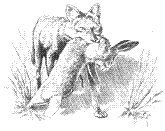Center, Internet, Wildlife Damage Management

Coyotes in the Southwest: A Compendium of Our Knowledge (Symposium Proceedings, 1995)
Date of this Version
January 1995
Document Type
Proceeding
Citation
Published in Coyotes in the Southwest: A Compendium of Our Knowledge, Symposium Proceedings, December 13–14, 1995, San Angelo, Texas
Edited by Dale Rollins, Calvin Richardson, Terry Blankenship, Kem Canon, and Scott Henke
Abstract
The development of immunocontraception as a tool for population management of coyotes (Canis latrans) and reduction of coyote predation may provide an environmentally safer alternative to pesticides. Because they are proteins, immunocontraceptive vaccines do not persist in the environment or bioaccumulate in the food chain. The National Wildlife Research Center (NWRC) will examine the effects (immunological, hormonal and behavioral) of treating penned coyotes with 2 immunocontraceptive vaccines: porcine zona pellucida (PZP) and gonadotropin releasing hormone (GnRH). Initial studies will be conducted using traditional subcutaneous injections; however, the goal IS to develop an orally-deliverable immunocontraceptive vaccine as an alternative tool for coyote population management.


Comments
Published 1996, Austin, Texas. Used by permission